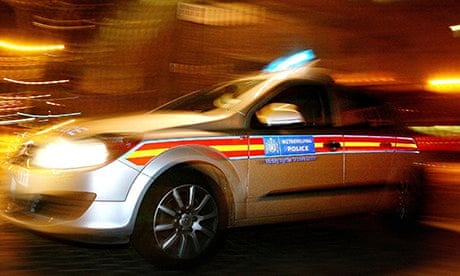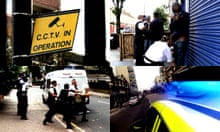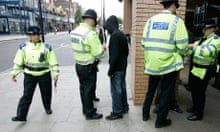Reports that a man is threatening to slash someone's throat before stabbing himself are radioed to Brent police officers at 5.30pm on a Thursday in August. As the unit closest to the scene, PC Paul Jones and his colleague turn on the sirens and radio back for more information. An ambulance is already on its way, but the officers learn that the 999 caller also happens to be the suspect.
"Calls relating to domestic violence or involving people with mental health disorders are a huge part of our work," Jones explains as the officers make their way to the scene. The pair regularly visit the address in north London that they are heading to now. They know that this is a case of someone with mental health problems.
"It makes me so upset. I don't want to put someone who is ill in handcuffs," Jones says. "But if I think there's a risk to someone I have to detain them."
I was with the Metropolitan police for three weeks to make a Guardian film about the controversial stop-and-search powers. But what I mainly witnessed was the unit responding to a range of helpless situations, from suicide threats, to people wandering naked down main roads, to frightened partners of drunk and angry men.
When officers find the man outside his home he reacts badly to the uniformed presence and begins to lash out. There is no sign of a knife, but, as Jones feared, his only option is to detain the 50-year-old. Together, they ride to the hospital in the ambulance.
Under section 136 of the Mental Health Act, if officers believe a person is in need of "immediate care and control" the individual is taken to a place of safety, defined as "a hospital, police station, mental nursing home or residential home". The ambulance heads to the nearest hospital, Northwick Park, only to find the ward is completely full. The frustrated patient attacks the driver and is transferred into a police van as Jones rings around other facilities. "Custody is not the place for an ill person," he says.
Central Middlesex hospital is full as well, so they head for St Charles hospital, in west London. By now, Jones is working overtime. When they arrive, doctors agree the patient is in need of help but wait for a social worker to assess whether he should be sectioned. Jones explains that this scenario is increasingly common because cuts to services mean people are being left to reach crisis point, and police are having to take the strain.
The social worker returns and concludes that the man is of no risk and should sober up then go back home. Jones is baffled: he thinks the threats of suicide and murder aren't the result of a few beers. "People are being released into the community based on the need for [hospital bed] space instead of the risk they pose to themselves and others," he says.
The distressed girlfriend, who has been following in a police car, is relieved and looks forward to getting back to her four children who are at home. Jones, on the other hand, knows this isn't over. He says: "You just end up seeing that same person again and again and again."






Comments (…)
Sign in or create your Guardian account to join the discussion